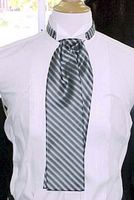TTAB Finds Fraud, Summarily Cancels "IT'S A GIRL THING" Registration
The folks at Happy Rompers were not happy campers when the Board granted a summary judgment motion cancelling its registration for the mark IT'S A GIRL THING on the ground of fraud. J.E.M. Int'l, Inc. v. Happy Rompers Creation Corp., 74 USPQ2d 1526 (TTAB 2005) [not citable].
The registration listed some 150 clothing items -- from aprons and ascots to wrist bands -- and in its Statement of Use (filed electronically), Happy Rompers claimed use of its mark on all the goods listed in its intent-to-use application. However, after the petition for cancellation was filed and discovery commenced, Happy Rompers changed its tune: it moved to amend the registration to delete more than 100 items. In light of the Board's ruling, however, that motion became moot.

J.E.M. International moved for summary judgment on the ground of fraud, relying on Happy Rompers' discovery responses, which showed that Rompers was not using, and had never used, its mark in connection with the subsequently-disavowed clothing items. J.E.M. urged that, under TTAB precedent, the entire registration should be declared void.
Happy Rompers, not surprisingly, contended that its submission of a statement of use without a request to divide was an "administrative error and oversight resulting from a lack of knowledge as to Trademark Office procedures; and that respondent did not have advise [sic] of counsel to file a request to divide." Its president declared that Rompers did not intend to defraud the PTO, and therefore Rompers argued that the summary judgment motion should be denied.
The Board was not impressed with Rompers' argument or its actions. While noting that "[o]rdinarily, cases involving questions of intent are unsuited to resolution by summary judgment," the Board agreed with J.E.M. that Medinol Ltd. v. Neuro Vasx Inc., 67 USPQ2d 1205 (TTAB 2003) is applicable here:
"A trademark applicant commits fraud in procuring a registration when it makes material representations of fact in its declaration which it knows or should know to be false or misleading. Id. at 1209. *** As in Medinol, respondent herein denies that its intent in submitting its statement of use was fraudulent. *** [T]aking into consideration the circumstances of a case, the appropriate inquiry is not into the registrant's subjective intent, but rather into the objective manifestations of that intent." Id.
The Board pointed out that the first nine items on the list of goods were among those 100 for which Rompers had not used its mark. "In their position at the beginning of the list, such items would be the first to catch a reader's eye and bring into question the breadth of actual use being made by respondent at the time of filing."
Even accepting respondent's statement "that it did not intend to make a misrepresentation and that its mistake was inadvertent," the Board noted that respondent signed its Statement of Use "[knowing] that such willful false statements may jeopardize the validity of . . . any resulting registration.... Statements made with such degree of solemnity clearly are -- or should be -- investigated thoroughly prior to signature and submission to the PTO."
The Board concluded that "respondent knew or should have known that its Statement of Use was materially incorrect."
"Respondent's knowledge that its mark was not in use on about 100 of the approximately 150 identified items -- or 'its reckless disregard for the truth -- is all that is required to establish intent to commit fraud in the procurement of a registration.' See Medinol v. Neuro Vasx, 67 USPQ2d at 1210."

This writer finds the Board's explanation of its decision to be a bit muddled. If it accepted Rompers' assertion that Rompers did not intend to commit fraud, how can the Board then say that intent was established by Rompers' actions? Wouldn't it have been better to rule that, even accepting Rompers' assertion, its reckless disregard for the truth constituted fraud. Why rely on "intent" while at the same time accepting Rompers' claim of no intent to commit fraud?
Text ©John L. Welch 2005. All Rights Reserved.




0 Comments:
Post a Comment
<< Home